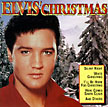 A pop music sub-genre called the "cash-in record," this takes place when a musical star becomes so famous that other people (read: record companies) feel obliged to perform songs about him or her. Elvis certainly falls into this category, wherein results this record, also performed by Debbie Dabney and co-written by Bobby Darin. Other examples include "I Want to Spend Xmas With Elvis" by Marlene Paul (UPDATE: this appears to be the exact same record as Debbie Dabney, based on the samples I was able to scare up from various sources) and "Elvis For Christmas" by Mad Milo, a Buchanan-Goodman styled novelty record. Note that these are just the Christmas-oriented Elvis cash-ins; there were plenty of others not related to the holiday, like "My Boy Elvis" by Janis Martin.
A pop music sub-genre called the "cash-in record," this takes place when a musical star becomes so famous that other people (read: record companies) feel obliged to perform songs about him or her. Elvis certainly falls into this category, wherein results this record, also performed by Debbie Dabney and co-written by Bobby Darin. Other examples include "I Want to Spend Xmas With Elvis" by Marlene Paul (UPDATE: this appears to be the exact same record as Debbie Dabney, based on the samples I was able to scare up from various sources) and "Elvis For Christmas" by Mad Milo, a Buchanan-Goodman styled novelty record. Note that these are just the Christmas-oriented Elvis cash-ins; there were plenty of others not related to the holiday, like "My Boy Elvis" by Janis Martin.
Recently in 1950s Category
 A pop music sub-genre called the "cash-in record," this takes place when a musical star becomes so famous that other people (read: record companies) feel obliged to perform songs about him or her. Elvis certainly falls into this category, wherein results this record, also performed by Debbie Dabney and co-written by Bobby Darin. Other examples include "I Want to Spend Xmas With Elvis" by Marlene Paul (UPDATE: this appears to be the exact same record as Debbie Dabney, based on the samples I was able to scare up from various sources) and "Elvis For Christmas" by Mad Milo, a Buchanan-Goodman styled novelty record. Note that these are just the Christmas-oriented Elvis cash-ins; there were plenty of others not related to the holiday, like "My Boy Elvis" by Janis Martin.
A pop music sub-genre called the "cash-in record," this takes place when a musical star becomes so famous that other people (read: record companies) feel obliged to perform songs about him or her. Elvis certainly falls into this category, wherein results this record, also performed by Debbie Dabney and co-written by Bobby Darin. Other examples include "I Want to Spend Xmas With Elvis" by Marlene Paul (UPDATE: this appears to be the exact same record as Debbie Dabney, based on the samples I was able to scare up from various sources) and "Elvis For Christmas" by Mad Milo, a Buchanan-Goodman styled novelty record. Note that these are just the Christmas-oriented Elvis cash-ins; there were plenty of others not related to the holiday, like "My Boy Elvis" by Janis Martin.
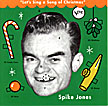 You might think that a musical genius like Spike Jones would be secure in his vision, but this 1956 album, reissued for the first time in 1998, exposes the man's inner conflicts. He and his City Slickers were famous for novelty music with wild stage antics that required tight discipline and musicianship, a pre-rock predecessor to Frank Zappa or the Tubes. But Jones' humorous music was constantly dogged by critics. As a result, he occasionally attempted to present more straight-faced fare, which turned out to be indistinguishable from the offerings of such as Lawrence Welk and which comprise the bulk of this Christmas album. Oh, there are some good novelties, like "Santa Claus's Son," "Nuttin' For Christmas," and the popular "All I Want for Christmas is My Two Front Teeth," and he buries an entertaining "Jingle Bells" in pig Latin inside an otherwise unremarkable medley. But most of the novelty stuff depends on trumpeter George Rock's bad-little-boy voice to carry the performance; a typical City Slickers outing had a much wider cast of characters. All in all, one of history's lost opportunities. UPDATE: Rhino had a reissue of this album out in the mid-1980s (I knew that, but forgot). Thanks to Chris Candreva for the reminder. He also notes that Billy May, arranger on this album, worked with Stan Freberg (see above) and also did the Carpenters' Christmas album -- Rich and Karen apparently were fans of the Spike Jones album. FURTHER UPDATE: Ted Hering tells us that Billy May wasn't involved with this album -- Jud Conlan was the arranger. Sure enough, Conlan, and the Jud Conlan Singers, are listed in the credits of the album. Conlan is credited with vocal arranging on every cut. And Richard Carpenter did liner notes for the reissue. Somehow, in those liner notes, I previously missed the fact that Spike also cut a version of "The Nutcracker Suite" in 1945, reissued as Christmas Crackers.
You might think that a musical genius like Spike Jones would be secure in his vision, but this 1956 album, reissued for the first time in 1998, exposes the man's inner conflicts. He and his City Slickers were famous for novelty music with wild stage antics that required tight discipline and musicianship, a pre-rock predecessor to Frank Zappa or the Tubes. But Jones' humorous music was constantly dogged by critics. As a result, he occasionally attempted to present more straight-faced fare, which turned out to be indistinguishable from the offerings of such as Lawrence Welk and which comprise the bulk of this Christmas album. Oh, there are some good novelties, like "Santa Claus's Son," "Nuttin' For Christmas," and the popular "All I Want for Christmas is My Two Front Teeth," and he buries an entertaining "Jingle Bells" in pig Latin inside an otherwise unremarkable medley. But most of the novelty stuff depends on trumpeter George Rock's bad-little-boy voice to carry the performance; a typical City Slickers outing had a much wider cast of characters. All in all, one of history's lost opportunities. UPDATE: Rhino had a reissue of this album out in the mid-1980s (I knew that, but forgot). Thanks to Chris Candreva for the reminder. He also notes that Billy May, arranger on this album, worked with Stan Freberg (see above) and also did the Carpenters' Christmas album -- Rich and Karen apparently were fans of the Spike Jones album. FURTHER UPDATE: Ted Hering tells us that Billy May wasn't involved with this album -- Jud Conlan was the arranger. Sure enough, Conlan, and the Jud Conlan Singers, are listed in the credits of the album. Conlan is credited with vocal arranging on every cut. And Richard Carpenter did liner notes for the reissue. Somehow, in those liner notes, I previously missed the fact that Spike also cut a version of "The Nutcracker Suite" in 1945, reissued as Christmas Crackers.
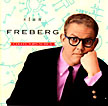 Stan belongs in the Christmas records' hall of fame for his Christmas novelty records of the 1950s. "Christmas Dragnet," a parody of the TV cop show, is from 1953 and itself was a sequel to Freberg's "St. George and the Dragonet," another Dragnet parody based on the legend of St. George and the Dragon. Freberg struck again with "Nuttin' For Christmas," and in 1958 took a funny and effective stab at social commentary with "Green Christmas," in which Bob Cratchit, owner of a spice shop in Orange, N.J., turns down advertising advice from Scrooge, here presented as chairman of the board of Scrooge Chiat Day, or some such high-powered New York ad agency. UPDATE: Fred Clemons corrects the release date of "Green Christmas" and notes that "Christmas Dragnet" was re-released as "Yulenet" in 1954, though it remains the same recording. End update. As for "Nuttin' For Christmas," Freberg hit the charts with this in December 1955 -- and so did the Fontaine Sisters and Barry Gordon, a seldom-equaled blitz of versions of a single song. The bad-litttle-boy riff makes this song a Christmas novelty staple, although Freberg's version throws in colloboration with an actual burglar at the end, making this version darker than the others, and need I add, funnier. UPDATE: Bob Bailey notes there were actually five charting versions of this song that year; the other artists were Joe Ward and Ricky Zahnd, the latter of whom went on to serve as vice president of the New York Knicks and the Rangers. I'm guessing the latter two's success was much more limited, since other sources I consulted didn't turn up their names.
Stan belongs in the Christmas records' hall of fame for his Christmas novelty records of the 1950s. "Christmas Dragnet," a parody of the TV cop show, is from 1953 and itself was a sequel to Freberg's "St. George and the Dragonet," another Dragnet parody based on the legend of St. George and the Dragon. Freberg struck again with "Nuttin' For Christmas," and in 1958 took a funny and effective stab at social commentary with "Green Christmas," in which Bob Cratchit, owner of a spice shop in Orange, N.J., turns down advertising advice from Scrooge, here presented as chairman of the board of Scrooge Chiat Day, or some such high-powered New York ad agency. UPDATE: Fred Clemons corrects the release date of "Green Christmas" and notes that "Christmas Dragnet" was re-released as "Yulenet" in 1954, though it remains the same recording. End update. As for "Nuttin' For Christmas," Freberg hit the charts with this in December 1955 -- and so did the Fontaine Sisters and Barry Gordon, a seldom-equaled blitz of versions of a single song. The bad-litttle-boy riff makes this song a Christmas novelty staple, although Freberg's version throws in colloboration with an actual burglar at the end, making this version darker than the others, and need I add, funnier. UPDATE: Bob Bailey notes there were actually five charting versions of this song that year; the other artists were Joe Ward and Ricky Zahnd, the latter of whom went on to serve as vice president of the New York Knicks and the Rangers. I'm guessing the latter two's success was much more limited, since other sources I consulted didn't turn up their names.
 Great song titles aren't all that common, more's the pity, but here's one that's just top-notch. Gayla Peevey, according to legend, was a regional child star of the Oklahoma City area, and this 1953 hit was recorded as a fund-raiser to bring the city zoo a hippo. The song raised $3,000 and the hippo was procured. Unfortunately, Matilda, the hippo, was scheduled to be transferred to Walt Disney World but died instead in March 1998. The song is campy as all get-out, but it never fails to raise eyebrows and perk up ears upon first hearing. It's on the first Dr. Demento compilation. Gayla Peevey herself writes in to add: "The record was released nationally by Columbia Records and because the Oklahoma City Zoo needed a hippo at the time, the song gave them the idea of putting together a major media blitz asking kids to send in nickels and dimes to raise money to buy Gayla a hippopotamus for Christmas. Matilda, a baby hippo, was presented to me, and I donated her to the zoo. In a roundabout way the song indeed helped the zoo aquire a hippo, but the song was not recorded for that purpose." Thanks, Gayla! UPDATE: The B-side of the original single was "Are My Ears On Straight," about a baby doll getting fixed up to be given as a Christmas gift. That tune seems to have disappeared off the face of the earth, however. Nor can I find a source for Gayla's later single with Mitch Miller, "The Angel On the Christmas Tree" backed with "Got a Cold In My Node For Christmas." And John Alfano writes in to tell us Gayla changed her name to Jamie Horton as a teenager when she recorded for Joy Records, where she had a hit with "My Little Marine." No mention of any further Christmas tunes, however.
Great song titles aren't all that common, more's the pity, but here's one that's just top-notch. Gayla Peevey, according to legend, was a regional child star of the Oklahoma City area, and this 1953 hit was recorded as a fund-raiser to bring the city zoo a hippo. The song raised $3,000 and the hippo was procured. Unfortunately, Matilda, the hippo, was scheduled to be transferred to Walt Disney World but died instead in March 1998. The song is campy as all get-out, but it never fails to raise eyebrows and perk up ears upon first hearing. It's on the first Dr. Demento compilation. Gayla Peevey herself writes in to add: "The record was released nationally by Columbia Records and because the Oklahoma City Zoo needed a hippo at the time, the song gave them the idea of putting together a major media blitz asking kids to send in nickels and dimes to raise money to buy Gayla a hippopotamus for Christmas. Matilda, a baby hippo, was presented to me, and I donated her to the zoo. In a roundabout way the song indeed helped the zoo aquire a hippo, but the song was not recorded for that purpose." Thanks, Gayla! UPDATE: The B-side of the original single was "Are My Ears On Straight," about a baby doll getting fixed up to be given as a Christmas gift. That tune seems to have disappeared off the face of the earth, however. Nor can I find a source for Gayla's later single with Mitch Miller, "The Angel On the Christmas Tree" backed with "Got a Cold In My Node For Christmas." And John Alfano writes in to tell us Gayla changed her name to Jamie Horton as a teenager when she recorded for Joy Records, where she had a hit with "My Little Marine." No mention of any further Christmas tunes, however.
 Not a song at all per se, it's a novelty record in which Santa meets up with a UFO, and the whole thing is reported on the news by "John Cameron Cameron," parodying longtime broadcast announcer John Cameron Swayze. And if that's not enough, when the record goes into question-and-answer format, JCC's questions are answered with actual snippets from rock songs, something we now call sampling. The "satellite" was a play on the duo's earlier hit, "The Flying Saucer." The artists, Bill Buchanan and Dickie Goodman, released several of these novelty records, and Goodman did several more as late as the mid-80s, including "Santa and the Touchables," which matched the jolly elf against organized crime and acted as a sequel to his own "The Touchables" and "The Touchables in Brooklyn." It's surprising that someone hasn't picked up the gauntlet and brought back this form of novelty recording. My guess is that copyright clearances are too expensive, especially now that artists get royalties for being sampled. Buchanan and Goodman were themselves sued at the time and settled out of court, according to Norm N. Nite's Rock On. The liner notes of Dickie Goodman and Friends' Greatest Fables, however, claim the courts eventually ruled in their favor. Naturally, they parodied the experience in "Buchanan and Goodman On Trial." By the way, Chuck Miller, a writer and columnist at Goldmine, informs us that although the record is credited to "Buchanan and Goodman," Buchanan does not appear on the record as he and Goodman split up earlier in the year; his voice is replaced by Paul Sherman.
Not a song at all per se, it's a novelty record in which Santa meets up with a UFO, and the whole thing is reported on the news by "John Cameron Cameron," parodying longtime broadcast announcer John Cameron Swayze. And if that's not enough, when the record goes into question-and-answer format, JCC's questions are answered with actual snippets from rock songs, something we now call sampling. The "satellite" was a play on the duo's earlier hit, "The Flying Saucer." The artists, Bill Buchanan and Dickie Goodman, released several of these novelty records, and Goodman did several more as late as the mid-80s, including "Santa and the Touchables," which matched the jolly elf against organized crime and acted as a sequel to his own "The Touchables" and "The Touchables in Brooklyn." It's surprising that someone hasn't picked up the gauntlet and brought back this form of novelty recording. My guess is that copyright clearances are too expensive, especially now that artists get royalties for being sampled. Buchanan and Goodman were themselves sued at the time and settled out of court, according to Norm N. Nite's Rock On. The liner notes of Dickie Goodman and Friends' Greatest Fables, however, claim the courts eventually ruled in their favor. Naturally, they parodied the experience in "Buchanan and Goodman On Trial." By the way, Chuck Miller, a writer and columnist at Goldmine, informs us that although the record is credited to "Buchanan and Goodman," Buchanan does not appear on the record as he and Goodman split up earlier in the year; his voice is replaced by Paul Sherman.
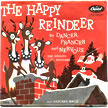 This December 1959 record was a fairly sappy attempt to cash in on the Chipmunks; the song itself is even a fairly transparent rewrite of "The Chipmunk Song." Another Chippers cop came from The Nutty Squirrels, who did several singles in that style including 1960's "Please Don't Take My Tree For Christmas." UPDATE: The Nutty Squirrels had "Nutty Noel" on the same single. The group was created by jazzers Sascha Burland and Don Elliot and they recorded three albums. Extra info and sleeve scan courtesy of Fred Clemens. (No live link from the album cover; couldn't find a reliable source for any of the songs mentioned in this post.)
This December 1959 record was a fairly sappy attempt to cash in on the Chipmunks; the song itself is even a fairly transparent rewrite of "The Chipmunk Song." Another Chippers cop came from The Nutty Squirrels, who did several singles in that style including 1960's "Please Don't Take My Tree For Christmas." UPDATE: The Nutty Squirrels had "Nutty Noel" on the same single. The group was created by jazzers Sascha Burland and Don Elliot and they recorded three albums. Extra info and sleeve scan courtesy of Fred Clemens. (No live link from the album cover; couldn't find a reliable source for any of the songs mentioned in this post.)
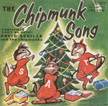 This 1958 record was the beginning of an entertainment dynasty; Chipmunks records and videos continue to be made even today. Like The Beatles' experiments with backward tapes on their records, the Chipmunks were the result of a happy accident, a tape played back at the wrong speed. The sound inspired Ross Bagdasarian to do a record that way, "Witch Doctor," released under the name David Seville. Later, he came up with the idea for The Chipmunks, starting with this holiday record. Several more hits followed; it's reputed that the Chipmunks kept Liberty Records from going out of business for many years. For many Baby Boomers, hearing this record is an indication that it's Christmas time. The original Chipmunks later did "Rudolph the Red-Nosed Reindeer," too, and in the Sixties they "jammed" with Canned Heat on "Christmas Blues," one of the more ludicrous pairings in the history of the record industry. UPDATE: Fred Clemons notes the original release of "The Chipmunk Song" is 1958, with the flip side being "Almost Good;" subsequent releases were backed with "Alvin's Harmonica," as was my 1959 copy. Also, he notes the artistic rendering of the 'Munks shown at left was replaced by the versions of Theodore, Simon and Alvin we're used to seeing in 1961.
This 1958 record was the beginning of an entertainment dynasty; Chipmunks records and videos continue to be made even today. Like The Beatles' experiments with backward tapes on their records, the Chipmunks were the result of a happy accident, a tape played back at the wrong speed. The sound inspired Ross Bagdasarian to do a record that way, "Witch Doctor," released under the name David Seville. Later, he came up with the idea for The Chipmunks, starting with this holiday record. Several more hits followed; it's reputed that the Chipmunks kept Liberty Records from going out of business for many years. For many Baby Boomers, hearing this record is an indication that it's Christmas time. The original Chipmunks later did "Rudolph the Red-Nosed Reindeer," too, and in the Sixties they "jammed" with Canned Heat on "Christmas Blues," one of the more ludicrous pairings in the history of the record industry. UPDATE: Fred Clemons notes the original release of "The Chipmunk Song" is 1958, with the flip side being "Almost Good;" subsequent releases were backed with "Alvin's Harmonica," as was my 1959 copy. Also, he notes the artistic rendering of the 'Munks shown at left was replaced by the versions of Theodore, Simon and Alvin we're used to seeing in 1961.
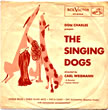 Dave Marsh and Steve Propes' book Merry Christmas Baby dates this record to 1955, but I thought it went back farther than that. Anyway, this record has become a Christmas classic. A fairly simple background track supports the sound of dogs barking the tune to the popular Christmas song. This was a lot harder to do in the 1950s than it is nowadays; it required hundreds of hours of recording barking dogs, putting the voices through a variable-speed oscillator to get the right pitches, then painstakingly editing the sounds into a song that fits in rhythm with the backing track. Today, you just sample half a dozen dogs into a computer and play it with a keyboard (see Jingle Cats). The creators didn't want their vision to be tied just to the holiday, though, so the B-side was "Oh Susanna." UPDATE: Fred Clemens confirms the original issue date of 1955 and notes the complete artist attribution should read "Don Charles presents The Singing Dogs directed by Carl Weismann." He also points out that the original issue had "Jingle Bells" in a medley with "Pat-A-Cake" and "Three Blind Mice," complete with a spoken introduction by a carnival barker, but was later, in 1971, edited down to just the familiar version, which itself was then re-edited to include an extra bridge and chorus. He also notes the following year (1956) the dogs, confirming that they were indeed nothing but hounds, issued "Hot Dog Rock 'n Roll" backed with "Hot Dog Boogie." Fred also sent us the cover scan of the original EP seen here.
Dave Marsh and Steve Propes' book Merry Christmas Baby dates this record to 1955, but I thought it went back farther than that. Anyway, this record has become a Christmas classic. A fairly simple background track supports the sound of dogs barking the tune to the popular Christmas song. This was a lot harder to do in the 1950s than it is nowadays; it required hundreds of hours of recording barking dogs, putting the voices through a variable-speed oscillator to get the right pitches, then painstakingly editing the sounds into a song that fits in rhythm with the backing track. Today, you just sample half a dozen dogs into a computer and play it with a keyboard (see Jingle Cats). The creators didn't want their vision to be tied just to the holiday, though, so the B-side was "Oh Susanna." UPDATE: Fred Clemens confirms the original issue date of 1955 and notes the complete artist attribution should read "Don Charles presents The Singing Dogs directed by Carl Weismann." He also points out that the original issue had "Jingle Bells" in a medley with "Pat-A-Cake" and "Three Blind Mice," complete with a spoken introduction by a carnival barker, but was later, in 1971, edited down to just the familiar version, which itself was then re-edited to include an extra bridge and chorus. He also notes the following year (1956) the dogs, confirming that they were indeed nothing but hounds, issued "Hot Dog Rock 'n Roll" backed with "Hot Dog Boogie." Fred also sent us the cover scan of the original EP seen here.
